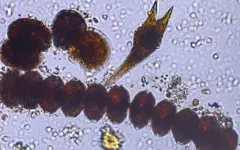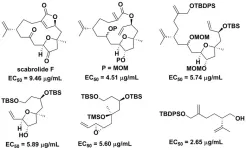(Press-News.org) SAN FRANCISCO —The Public Library of Science (PLOS) is pleased to announce a consortium agreement with Consorcio Colombia / Consortia facilitated by Accucoms, that allows joining member institutions to participate in PLOS’ three innovative publishing models across all 14 PLOS titles. The agreement provides researchers from affiliated institutions unlimited publishing privileges in PLOS journals without incurring fees. Eight Colombian institutions have joined the agreement in 2024 [1], and more institutions are expected to join in the following years.
“Consorcio Colombia is a collaborative work initiative with great recognition in Latin America and constantly seeks options to facilitate access to information and open access in the country. That is why it decided to sign an agreement with PLOS to facilitate the publication of the research community in one of the most important open access publishers in the world. With this, we hope to increase the visibility and academic impact of our research while promoting sustainable models of scientific communication,” said César Rendón, CEO of Consortia.
Mónica Cristancho, Library Director at Universidad El Bosque, one of the participating institutions in 2024, said, “Collaborating with PLOS, through the open access agreement with Consorcio Colombia, has been crucial in promoting the publications of researchers from Universidad El Bosque. Thanks to this partnership, our researchers have the opportunity to share their discoveries widely and accessibly, adhering to the fundamental principle of open access to scientific information. This not only democratizes knowledge, allowing anyone to freely access research findings, but also fosters global collaboration. Thus, this agreement is not only beneficial for our institution and our researchers, but also contributes to the advancement of science and the welfare of society at large.”
PLOS institutional business models such as Community Action Publishing (CAP) [2], Flat Fees [3], and Global Equity [4] ensure more equitable and regionally appropriate ways to support Open Access publishing.
“Our agreement with Consorcio Colombia will help to expand PLOS’ footprint in South America and provide equitable access to Open Science opportunities for researchers in the region,” said Roheena Anand, Executive Director of Global Publishing Development & Sales at PLOS. “Consorcio Colombia shares our intention of removing barriers for authors to publish Open Access and building business models which move journals toward a more equitable and fee-free form of publishing.”
“I am happy to have collaborated on the negotiation of a very first PLOS consortium agreement in Latin America. This agreement allows Colombian institutions to sign up for unlimited publishing in all PLOS journals without APC fees for their researchers, at a very accessible cost for the institutions. It is great to see that 8 institutions have already signed up in 2024, and I’m confident many more Colombian institutions will understand the benefits of this agreement and will join in the coming few years,” said Anouk Snijders, Commercial Manager Latin America, Accucoms.
The members of Consorcio Colombia join a growing list of institutions in Latin America, including UNAM, CINVESTAV, and INCMNSZ in Mexico and Universidad Nacional Agraria La Molina in Peru among others, to support their researchers through unlimited publishing deals with PLOS.
The Association of Learned and Professional Society Publishers (ALPSP) honored PLOS as the 2021 co-winner for Innovation in Publishing for its Community Action Publishing model.
About the Public Library of Science
PLOS is a nonprofit, open access publisher empowering researchers to accelerate progress in science and medicine by leading a transformation in research communication. Since our founding in 2001, PLOS journals have helped break boundaries in research communication to provide more opportunities, choice, and context for researchers and readers. For more information, visit http://www.plos.org.
About Consorcio Colombia / Consortia
The Colombia Consortium is an alliance between Higher Education Institutions and research centers in the country that seeks to strengthen institutional capacities through subscription and access to digital resources for training and research processes, in addition to the development of projects of common interest.
The Colombia Consortium has a presence in the 6 regions of the country and currently has 63 participating institutions, which are diverse in their nature (public or private), in their size and research capacity. However, they all share the same need and the same interest in managing the best conditions of access to relevant, updated and quality scientific information to successfully advance the mission processes of higher education institutions and research centers. For more information visit https://www.consorciocolombia.co.
About Accucoms
We are the leading provider of sales and marketing services to academic and professional publishers worldwide. We have extensive expertise in global representation for clients ranging from large publishing houses to specialist society publishers. We work on behalf of publishers to help boost their sales, expand their readership, and increase customer retention and engagement in the markets that are important to them. www.accucoms.com.
[1] Universidad El Bosque, Universidad Pedagógica y Tecnológica de Colombia, Universidad del Tolima, Universidad Militar Nueva Granada, Universidad de la Amazonía, Universidad de Medellín, Universidad del Magdalena, Universidad Colegio Mayor de Antioquia.
[2] Participating journals include PLOS Biology, PLOS Medicine and PLOS Sustainability and Transformation.
[3] Participating journals include PLOS Digital Health, PLOS ONE, PLOS Computational Biology, PLOS Pathogens, PLOS Neglected Tropical Diseases, PLOS Genetics, and PLOS Complex Systems.
[4] Participating journals include PLOS Climate, PLOS Water, PLOS Global Public Health, and PLOS Mental Health.
END
PLOS announces new publishing agreement with Colombian consortium
2024-06-26
ELSE PRESS RELEASES FROM THIS DATE:
New survey from NCCN finds cancer drug shortage management remains a moving target, impacting clinical trials
2024-06-26
PLYMOUTH MEETING, PA [June 26, 2024] — The National Comprehensive Cancer Network® (NCCN®)—a nonprofit alliance of leading cancer centers—is publishing new results for its latest survey on cancer drug shortages in the United States. This follows data published one year ago, and six months ago, illustrating how up to 93% of centers surveyed were experiencing shortages of the crucial chemotherapy carboplatin at its peak. In June 2023, 70% of centers surveyed were also lacking adequate supply for cisplatin. In the latest survey, only 11% of surveyed centers reported a shortage of carboplatin and 7% for cisplatin; but new concerns have emerged.
“Critical ...
Biting flies on dairy farms can spread bovine mastitis
2024-06-26
Highlights:
Bovine mastitis is a potentially fatal condition with myriad known causes, including bacteria.
Biting flies may help cause mastitis, but the mechanisms are not well elucidated.
Researchers characterized microbial diversity in biting flies and manure to look for connections.
The flies carried relevant bacterial strains, also found in the manure, associated with mastitis.
The research may point to new strategies for protecting cows from disease-causing pathogens.
Washington, D.C.—Bovine mastitis, which affects cows, leads to reduced milk production and can be fatal if left untreated. The USDA National Animal Health Monitoring ...
Balancing act: Novel wearable sensors and AI transform balance assessment
2024-06-26
Balance can be impacted by various factors, including diseases such as Parkinson’s disease, acute and chronic injuries to the nervous system, and the natural aging process. Accurately assessing balance in patients is important to identify and manage conditions that affect coordination and stability. Balance assessments also play a key role in preventing falls, understanding movement disorders, and designing appropriate therapeutic interventions across age groups and medical conditions.
However, traditional methods used to assess balance often suffer from subjectivity, are not comprehensive enough and cannot be administered remotely. Moreover, these assessments rely on expensive, ...
Study reveals twisted origin of dead stars’ mysterious ‘heartbeats’
2024-06-26
Stars blinking code in Netflix’s “3 Body Problem” might be science fiction, but by deciphering neutron stars’ erratic flickers, a new study has revealed the twisted origin of these dead stars’ mysterious “heartbeats.”
When neutron stars—ultra-dense remnants of massive stars that exploded in supernovae—were first discovered in 1967, astronomers thought their strange periodic pulses could be signals from an alien civilization. Although we now know these “heartbeats” ...
Some landfill ‘burps’ contain airborne PFAS, study finds
2024-06-26
Many municipal landfills “burp” gas from decomposing organic matter rather than letting it build up. And burps from buried waste containing per- and polyfluoroalkyl substances (PFAS) can release these “forever chemicals” into the air, say researchers in ACS’ Environmental Science & Technology Letters. Their study reports unexpectedly high levels of airborne PFAS at three landfills and demonstrates that vented gases and liquid by-products called leachates could transport similar amounts of these contaminants to the environment.
Some consumer products and commercial waste, such as children’s clothing, cosmetics and wastewater treatment sludge solids, contain ...
Small, adsorbent ‘fins’ collect humidity rather than swim through water
2024-06-26
Clean, safe water is a limited resource and access to it depends on local bodies of water. But even dry regions have some water vapor in the air. To harvest small amounts of humidity, researchers in ACS Energy Letters have developed a compact device with absorbent-coated fins that first trap moisture and then generate potable water when heated. They say the prototype could help meet growing demands for water, especially in arid locations.
Earth’s atmosphere holds trillions of liters of fresh water as vapor, but it’s challenging to collect this colorless, transparent and dilute gas. Previously, researchers developed systems that trap ...
Plankton researchers urge their colleagues to mix it up
2024-06-26
Comprising the base of the food web, plankton are extremely important to marine ecosystems. However, there is still much to be discovered about these organisms, and that’s especially true for mixoplankton.
Plankton are typically divided into two groups. Similar to plants, phytoplankton contain chlorophyll and derive energy from photosynthesis. Zooplankton, on the other hand, consume other organisms for their energy. However, there is also a third group, mixoplankton, that is a combination of the two. And, despite accounting for, at times, more than half of all plankton in the ocean, they remain ...
Leading-edge model predicts impact of river plants on flood level
2024-06-26
River plants provide ecological and environmental benefits, but they raise flood risk by blocking the flow during heavy rain. Removing woody riparian vegetation patches is a primary flood prevention method, but it threatens stream's biodiversity. The research team at the Korea Institute of Civil Engineering and Building Technology (KICT, President Kim, Byung-Suk) has developed a technology for quantifying the effect of river vegetation patches on flood level changes to aid in better decision-making of river management for balancing ecological benefits and flood mitigation.
Rivers ...
Towards non-toxic antifouling agents: A novel method for total synthesis of scabrolide F
2024-06-26
Marine organisms produce many organic compounds with diverse chemical structures and biological activities. These natural marine products are regarded as potential starting points for the discovery and development of new drugs. Among these are norcembranolide diterpenes isolated from the soft corals of the genus Sinularia. These compounds exhibit diverse biological activities, and many of them have anti-cancer and anti-inflammatory properties. Consequently, many studies have investigated the properties of norcembranolide diterpenes and their synthesis methods. Given their potential in drug discovery, developing a synthetic ...
Researchers identify vascular changes in the brain linked to Alzheimer's disease
2024-06-26
JACKSONVILLE, Florida — The blood-brain barrier — a network of blood vessels and tissues that nurtures and protects the brain from harmful substances circulating in the blood — is disrupted in Alzheimer's disease. Now, researchers at Mayo Clinic and collaborators have uncovered unique molecular signatures of blood-brain barrier dysfunction that could point to new ways to diagnose and treat the disease. Their findings are published in Nature Communications.
"These signatures have high potential to become novel biomarkers that capture brain changes in Alzheimer's ...






